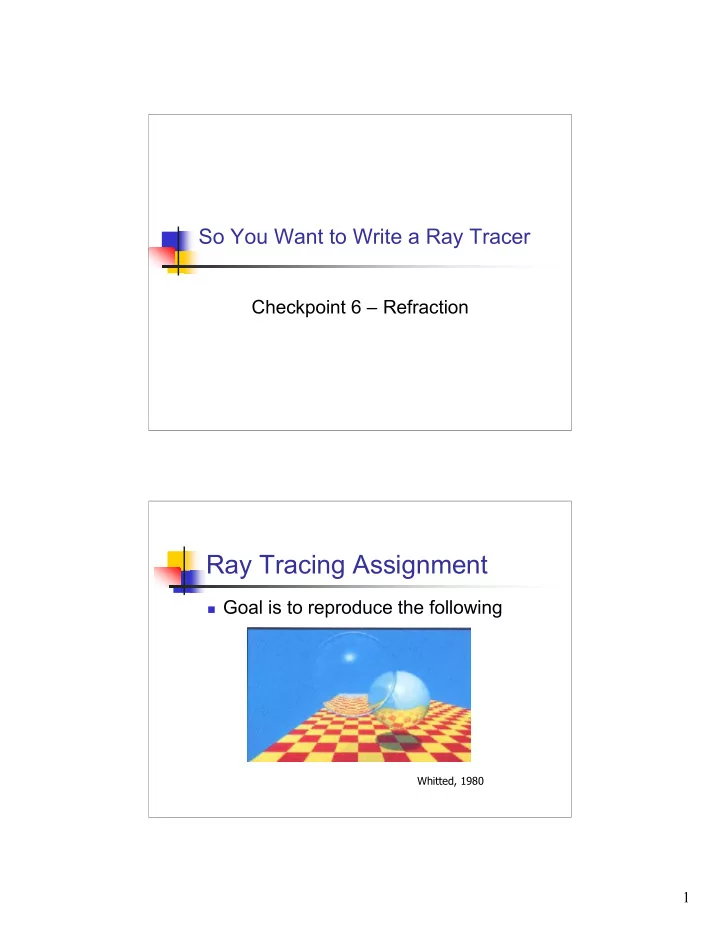

So You Want to Write a Ray Tracer Checkpoint 6 – Refraction Ray Tracing Assignment Goal is to reproduce the following Whitted, 1980 1
Ray Tracing Assignment Seven checkpoints Setting the Scene Camera Modeling Basic Shading Procedural Shading Recursive Ray Tracing – Reflection Recursive Ray Tracing – Transmission Tone Reproduction Ray Tracing Assignment Seven checkpoints Setting the Scene Camera Modeling Basic Shading Procedural Shading Recursive Ray Tracing – Reflection Recursive Ray Tracing – Transmission Tone Reproduction 2
Refraction Perform recursive ray tracing by considering reflection and refraction Parameters to add: For each object k r , k t – reflection and transmission constants k t ≠ 0 for this checkpoint Index of refraction (example 0.95) Recursive Ray Tracing color illuminate (ray, depth) find closest intersect if (!intersection) return background color else spawn shadow ray retcolor = local illumination if (depth < MAX_DEPTH) if (k r > 0) spawn reflection ray retcolor += k r * illuminate (reflect ray, depth+1) if (k t > 0) spawn transmission ray retcolor += k t * illuminate (trans ray, depth +1) return retcolor 3
Recursive Ray Tracing For each pixel spawn ray from camera pos to pixel pixel_color = illuminate (ray, 1) Calculating Transmission Ray Starting with Snell’s law d n � i η θ = η θ sin sin � i i i t t η t θ Assume d and n are normalized. t t We can find the equation for t, the transmission ray: d is the incoming ray, t is the 2 η − • η − • 2 transmission ray. ( d n(d n) ) ( 1 ( d n ) ) i i t = + n 1 - 2 η η t t If negative – total internal reflection 4
Total Internal Reflection an optical phenomenon that occurs when light is refracted (bent) at a medium boundary enough to send it backwards, effectively reflecting all of the light. In these cases, the transmission ray will be spawned in the reflection direction. Total Internal Reflection Wikipedia 5
Total Internal Reflection Total internal reflection occurs around boundary of transparent sphere Calculating transmission ray Snell’s law applet http://www.physics.northwestern.edu/ugrad/vpl/opt ics/snell.html Index of refraction of air = 1.0 Optimization If indices of refractions are the same no bending Transmission direction is the same as incoming direction 6
Things to think about Must keep track if you are inside or outside Index of refraction η Normal vector Things to think about 2 ways to deal If n • d < 0 then Inside Use –n as normal for calculations Use inside η as � i Keep track as you are spawning rays 7
Things to think about public Vector3f faceForward (Vector3f A Vector3f B) { // For acute angles, dot product will // be positive if (A.dot(B) >= 0) return A; // Obtuse angle, reverse the first vector Vector3f V = new Vector3f (A); V.scale (-1.0f); return V; } Refraction For sake of checkpoint Make one sphere transparent (k t = 0.8) Make other sphere non-transparent May wish to test first with index of refraction = 1.0 8
Refraction Note: If done correctly, you should now have a faithful reproduction of the target image. Sample parameters Sphere2 – rear Sphere1 – front Color (amb/diffuse) Color (all) = white (0.7, 0.7, 0.7) Ka = 0 .0 7 5 Color (spec) = white Kd = 0 .0 7 5 Ka = 0 .1 5 Ks = 0 .2 Kd = 0 .2 5 Ke = 2 0 .0 Ks = 1 .0 Kr = 0 .0 1 Ke = 2 0 .0 Kt = 0 .8 5 Kr = 0 .7 5 Kt = 0 .0 Refraction Due date: Must be posted to Web site by Feb 6th Recall: 10% penalty per day Having trouble? Let me know EARLY. Questions? 9
Extra extra For 5 points: Adjust shadow ray based upon transparency of objects. 10
Recommend
More recommend